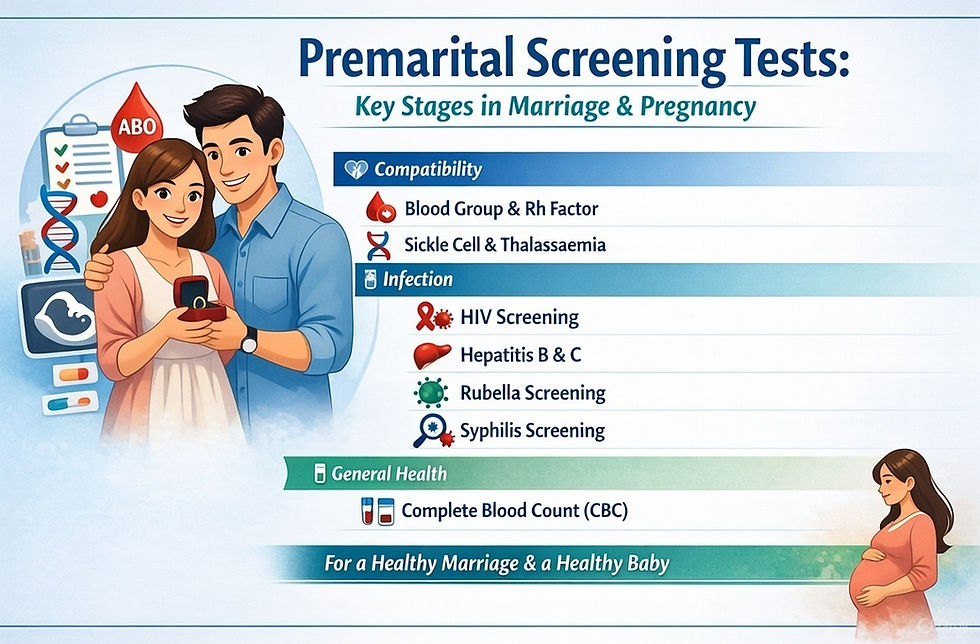IVF Premedical Tests: What You Need to Know
- EJB
- Dec 12, 2024
- 4 min read

Embarking on the journey of In Vitro Fertilization (IVF) is a significant step toward overcoming infertility and achieving parenthood. However, before one can begin the actual process of IVF, it's crucial to undergo a series of premedical tests. These tests are designed not only to increase the chances of successful conception but also to ensure the health and safety of both the prospective parents and the potential child. Here's what you need to know about these essential pre-IVF tests.
During IVF, eggs are retrieved from a woman's ovaries and fertilized with sperm in a laboratory. The fertilized eggs, called embryos, are then transferred to the woman's uterus.
Before starting IVF, it is important to have a premedical evaluation. This evaluation will help determine if you are a good candidate for IVF and will help identify any potential problems that could affect your chances of success.
What are the different types of premedical tests for IVF?
There are many different types of premedical tests that may be recommended before starting IVF. Some of the most common tests include:
1. Ovarian Reserve Testing
The first step often involves assessing the ovarian reserve, which gives an insight into the quantity and quality of the eggs remaining in a woman's ovaries. The tests generally include:
Anti-Mullerian Hormone (AMH) Test: This blood test measures AMH levels, which correlate with the number of eggs left in the ovaries. A higher AMH level suggests a better ovarian reserve.
Follicle-Stimulating Hormone (FSH) Level: Measured on day 3 of the menstrual cycle, elevated FSH levels can indicate a diminishing ovarian reserve.
Estradiol Levels: This hormone is tested alongside FSH to provide a clearer picture, as high estradiol can mask elevated FSH levels.
2. Semen Analysis
For male partners, a semen analysis is fundamental. This test evaluates:
Sperm Count: The number of sperm in the ejaculate.
Sperm Motility: How well the sperm moves, which is critical for fertilization.
Sperm Morphology: The shape of the sperm, as abnormalities can affect sperm function.
3. Tubal Patency Test
This test checks if the fallopian tubes are open, which can be crucial even in IVF as sometimes natural fertilization might occur before egg retrieval. Common methods include:
Hysterosalpingography (HSG): An X-ray procedure where dye is injected into the uterus and fallopian tubes to see if they are open.
Sonohysterography (SHG) or Saline Infusion Sonography (SIS): Uses ultrasound with saline to visualize the same.
These tests can also identify any uterine abnormalities that might need addressing before an embryo transfer. The results can dictate whether additional techniques like Intracytoplasmic Sperm Injection (ICSI) might be necessary.
4. Hormonal Profile
Beyond FSH, other hormone levels like:
Prolactin: High levels can interfere with ovulation.
Thyroid Stimulating Hormone (TSH): Thyroid function can impact fertility and pregnancy outcomes.
Ensuring these hormones are within normal ranges can optimize the IVF process.
5. Infectious Disease Screening
Both partners undergo screening for infectious diseases such as:
HIV
Hepatitis B and C
Syphilis
6. Genetic Testing
Although not mandatory for everyone, Preimplantation Genetic Testing (PGT) can be recommended for couples with a history of genetic disorders. It involves:
PGT-A (Aneuploidy): Screening for chromosomal abnormalities in embryos.
PGT-M (Monogenic/Single Gene): For couples at risk of passing on specific genetic diseases.
7. Uterine Assessment
A thorough evaluation of the uterine environment is vital:
Transvaginal Ultrasound: To look for any structural issues or fibroids.
Hysteroscopy: A direct look inside the uterus to ensure it's free from obstructions or abnormalities.
What are the benefits of having premedical tests before starting IVF?
There are many benefits to having premedical tests before starting IVF. Some of the benefits include:
Identifying potential problems: Premedical tests can help identify any potential problems that could affect your chances of success.
Choosing the best treatment: Premedical tests can help you and your doctor choose the best IVF treatment for you.
Increasing your chances of success: By addressing any potential problems before starting IVF, you can increase your chances of success.
What are the risks of having premedical tests?
Most premedical tests are safe and have no risks. However, some tests may have some minor risks, such as discomfort or bleeding.
How can I prepare for premedical tests?
There are a few things you can do to prepare for premedical tests:
Talk to your doctor: Your doctor can explain the different types of premedical tests and answer any questions you have.
Schedule your tests: Make sure to schedule your tests in advance.
Follow the instructions: Be sure to follow the instructions for each test.
What should I do after my premedical tests are complete?
Once your premedical tests are complete, your doctor will review the results with you. If you are a good candidate for IVF, your doctor will discuss your treatment options with you.
Conclusion
Premedical tests before IVF are not just procedural; they are a cornerstone in planning a personalized, effective IVF treatment plan. They aim to maximize success rates while minimizing risks, providing couples with the best possible start in their quest for parenthood. Always consult with your fertility specialist to understand which tests are relevant to your specific situation and to interpret the results accurately.




Comments